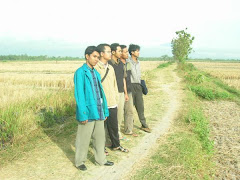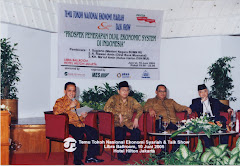Islamic Banking Blooms in Bangladesh
27 June, 2008 by Nirijna Kuhen
"The future of the Islamic banking systems is so bright," Mominul Islam Patwary, Chairman of the executive committee of Islami Bank Bangladesh Limited, told IslamOnline. net.
The Islamic banking is seeing impressive growth in Bangladesh
Patwary says that his bank is now one of the top performer banks in terms of business and profits among the 48 commercial banks operating in the country.
"Islamic Bank Bangladesh Limited has gained first position in the all private banks in term of deposits, investment, export & import and remittance collection."
According to the Bangladesh Bank (BB), the central bank of the country, the deposits of the Islamic banking systems are now 25 percent of all private banks deposits and its investments are 30 percent.
Bahauddin Mohammad Yousuf, vice chairman of Al-Arafah Islamic Bank, has an explanation for Bangladesh's Islamic finance boom.
He says that for a Muslim, whose religion prohibits earning or paying interests, Islamic banking makes it possible to operate interest-free business. "People of this country are religious," Patwary, of the Islami Bank, agrees. Islam forbids Muslims from usury, receiving or paying interest on loans.
Shari`ah-compliant financing deals resemble lease-to-own arrangements, layaway plans, joint purchase and sale agreements, or partnerships.
New Order
Bankers believe that the Islamic banking is set for even more progress, if a law governing Islamic Banking policies is introduced.
"If an Islamic banking Act is introduced, the Islamic banking systems will even further flourish," Patwary said.
Experts predict that with the rapid rise of Shari`ah-based systems, the industry will ultimately turn to be the financial mainstream in Bangladesh.
"The interest-free Shari`ah-based systems will be mainstream Banking and the conventional banks will be the minority systems in the OIC countries including Bangladesh within 2002," M Azizul Haque, a leading expert on Islamic banking in Bangladesh, told IOL.
Azizul Haque, who is also chairman of the Shari`ah Council of Dhaka, believes that Bangladesh will follow the rest of the world to the Islamic banking sector.
He explains that the growth rate of Islamic banking in the OIC countries for example is 15 to 20 percent while that of conventional banks is 10 to 15 percent.
Islamic finance is one of the fastest growing sectors in the global financial industry.
In defiance of the credit crunch, the global Islamic finance market has grown about 15 percent in each of the past three years, and is now worth about $700 billion worldwide.
Currently, there are nearly 300 Islamic banks and financial institutions worldwide.
Its assets are predicted to grow to $1 trillion by 2013.
Azizul Haque expects that higher growth rates in the next decade will force the global financial systems to Islamic banking.
"There is not any sort of apprehension regarding the success of Islamic banking," the renowned economic expert said.
"Capitalization could not solve the global economic problems.
"The world is looking for a new economic order. Islamic economic system will be that new economic order."








Tidak ada komentar:
Posting Komentar